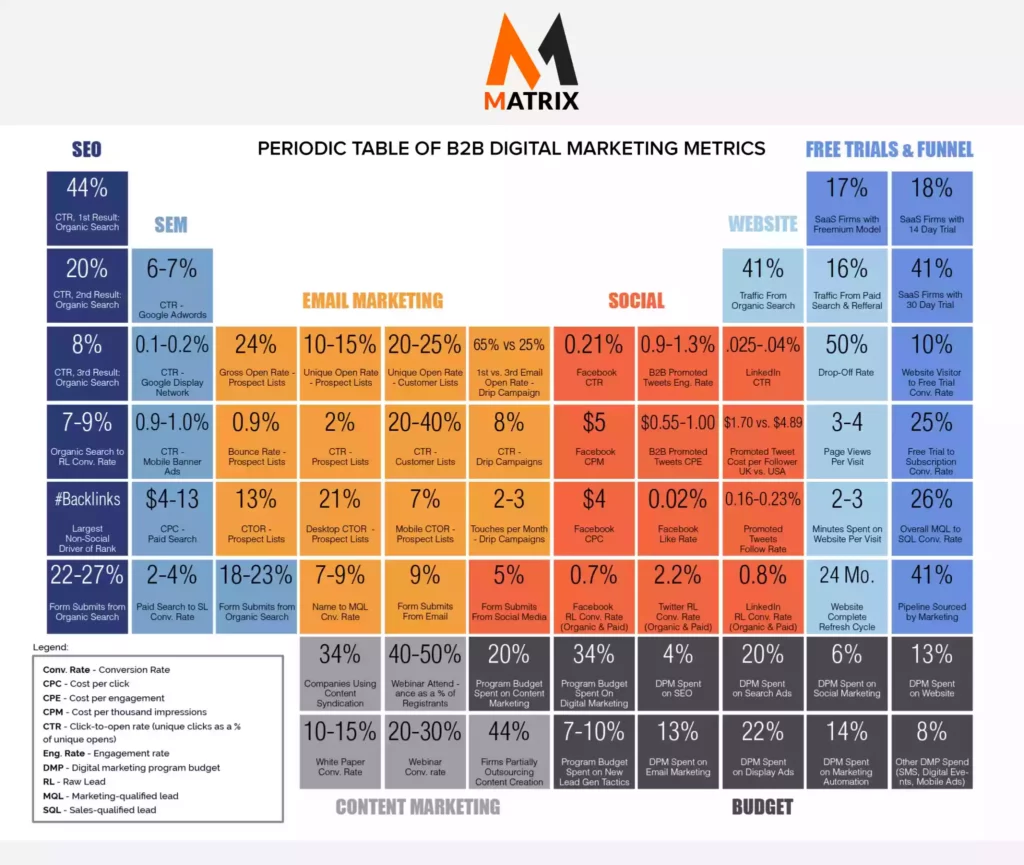The chief marketing officer role must require an understanding of technology.
The Chief Marketing Officer role is becoming more involved with marketing technology selection, implementation, and use.
Marketing is becoming one of the most technology-dependent functions in business. Today, a company’s chief marketing officer spends more on technology than its chief information officer. That oft-quoted claim seems more credible every day.
Today, technology is integral to nearly every business’s marketing strategy. Without embracing it and optimizing its application, a business risks its ability to compete effectively and connect to a customer base.
Therefore, the Chief Marketing Officer (CMO) plays a major role in selecting and purchasing marketing technology. You need marketing technology if you want to:
- Test your marketing programs
- Scale marketing campaigns and reduce customer acquisition cost
- Track, monitor, and adjust marketing programs
Don’t think you need marketing technology. Try doing it manually. Good luck.
As a CMO, you are uniquely positioned to determine the best technological tools for better connecting with customers and driving growth.
This is because of your intricate knowledge of your customers and their relationship with your product or business.
This is in addition to your insights regarding future growth plans and business goals. Denver Digital Marketing Agencies are Failing Their Clients.
To succeed, you need to analyze key avenues where technology is vital to growth and competition through the lens of your business’s needs.
The Chief Marketing Officer’s Role is to Gather Information on the Target Market

Never before has so much information on the customer been instantly available, and information on how to better interact with the customer is key to marketing. Using measurement and analytics, from social media metrics to KPIs to CRM, tracking customer interaction has never been easier.
Marketing technologies include IBM’s Watson, SAP, Salesforce, Microsoft, and HubSpot. New AI tools help CMOs generate content. But don’t fire your copywriter yet.
They can be tracked from the web when they discover and search for your product or service. They can gather information and build a relationship with a brand. And when they close the loop and buy a product, the sales are complete.
Social log-ins are easy and provide the vendor with useful information. AI Agentic Systems for Marketing Healthcare Organizations
Social media provides information on age, gender, location, and more, giving marketers even more information on their key demographic.
Beyond basic information gathering, technology can organize this data into patterns that drastically reveal opportunities for a business to improve itself.
Artificial intelligence (AI) is promising for chief marketing officers.
The Chief Marketing Officer – Reaching Niche Markets
With technological growth, more channels are available for businesses to reach out to their customers, be seen, and build a brand. With careful research, you can:
- Tap into new niche markets
- Target your desired demographic
- Improve conversion rates
- Build a fan base
- Create lifelong customers
To do this, understanding the current customer base, built through analytics, must be combined with knowing which channels to invest time and money in.
As CMO, you will design this research to understand where the business’s future marketing is headed and which channels are used to build customer-facing technology solutions.
Keeping Brand Established and Networks Synchronized
As your business’s marketing network becomes more niche and spread out, it cannot become fragmented or lose brand identity. Moving forward coherently on various marketing fronts can take time and resources.
Technology must keep everything organized, updated, and synchronized with the business’s overall message.
As CMO, your relationship with the brand and customers will play a major role in selecting the best marketing operations technologies for managing buyer interactions and intent.
OrchestraAI Marketing Platform – WATCH
OrchestraAI utilizes a compound AI agent architecture as an AI Agentic Platform. This architecture seamlessly integrates multiple specialized AI agents into a cohesive system, enabling it to tackle complex, multifaceted marketing tasks.

Customer Experience and the Chief Marketing Officer Role
With the world surging forward with new online trends and devices, it’s important to keep up and provide the customer with an experience suited to the times.
Businesses are losing opportunities and eroding their reputations by using outdated websites or technologies that are not device-compatible. You must know how your customers’ experiences should go and match those expectations with the right enabling technologies.
Increasing Lead Conversion and Marketing ROI
All the work and investment to better connect with customers and identify technologies and channels is all an effort toward increasing long-term ROI. Whatever their cost, the technologies selected must provide more value in the long term to succeed.
Absolutely! Here’s how you can explain to the CEO why increasing lead conversion will boost marketing ROI:
Higher Conversion Rate = More Customers for the Same Budget
Imagine you’re running a billboard ad campaign to generate leads. You pay the same for the billboard space regardless of how many people convert into leads from seeing the ad. You get more customers from the same marketing budget by increasing the conversion rate (the percentage of leads that convert into customers). This translates directly to a higher return on investment (ROI) for your marketing efforts. What are Digital Marketing Services?
Here’s a simple example:
- Scenario A: You spend $1,000 on marketing and generate 100 leads, but only 2% convert into customers (2 sales).
- Scenario B: You spend $1,000 on marketing and generate 100 leads, but with a higher conversion rate of 5% (5 sales).
In both scenarios, you spend the same amount on marketing. But by doubling your conversion rate, you get 2.5 times more sales for the same investment. This significantly boosts your marketing ROI.
Increased Conversion Means More Qualified Leads
A higher conversion rate often indicates you’re attracting better-qualified leads. These leads are a good fit for your product or service and are more likely to convert into sales. This can happen by:
- Targeting your marketing efforts: Sharper targeting ensures you reach people who genuinely need what you offer.
- Improving your lead capture forms: Ask the right questions to qualify leads upfront.
- Offering valuable content: Content that educates and addresses your target audience’s pain points attracts qualified leads.
By focusing on conversion rate optimization, you’re not just getting more customers, but you’re getting the right customers. This translates into higher customer lifetime value and a more sustainable business model.
In conclusion, increasing lead conversion is a powerful lever to boost your marketing ROI. It allows you to get more out of your existing marketing budget, attracts better-qualified leads, and ultimately leads to more sales and customer satisfaction.
Affordable SEO Solutions That Drive Real Results
Matrix Marketing Group Delivers Customized SEO Strategies with Transparent Pricing for Maximum ROI. See SEO Services.
While this always involves some risk, the CMO should be able to select the greatest possible investments based on a business plan.
When applied well, technology can enable a business to grow in ways that could never have been imagined without modern tech’s help.
AI-Agentic System for Content Marketing
AI-Agentic systems like OrchestraAI for content marketing are advanced, autonomous technologies designed to execute content strategies with minimal human intervention.

Looking Toward the Future of Marketing Technology and the Chief Marketing Officer Role
Investing in marketing technology is not a task to take lightly. With many technological solutions available, careful research and planning must ensure that money is spent wisely.
The CMO must take the time to build a map of where the business needs to go in the future. With these specific goals in mind, you can research which technologies will make that journey easier.
Because you have laid out a specific plan, you can evaluate each vendor and tech purchase information to determine whether it is a specific fit.
New skills may need to be developed to fully understand the products being reviewed, especially if you are unfamiliar with marketing technology.
This may make the research phase slow and tedious, highlighting its importance.
Careful evaluation during this phase can lead to advantages later on, as the right tech selections can exponentially boost the effectiveness of marketing campaigns and interactions.
It helps to work with your IT team, especially if you lack experience with technology. However, understanding technological workings is preferable because it will allow you to gain an advantage over your competitors. AIProdPad Product Development Transformation Through AI-Driven Innovation [White Paper]
Putting the Pieces of Marketing Technology Together for the Chief Marketing Officer Role

What the role of the chief marketing officer is will surprise you. The CMO is responsible for creating and executing a holistic brand strategy through innovative marketing tactics.
They drive the customer journey from awareness to loyalty, establish key performance indicators (KPIs) to measure success, develop the infrastructure to support marketing operations, and manage resources effectively.
This rise in digital budgets is not merely a migration of spending from traditional to digital media. A growing portion of marketing’s budget is now allocated to marketing technology.
A recent Gartner study found that 67% of marketing departments plan to increase their spending on technology-related activities over the next two years. Digital Marketing for Solar Dealers to Increase Sales
In addition, 61% are increasing capital expenditures on technology, and 65% are increasing budgets for service providers with technology-related offerings.
Armed with knowledge and research, you can evaluate the technology options to see which products fit together like puzzle pieces to help grow your business.
This allows you to create an optimized custom tech solution. A specifically designed system will be more effective than any out-of-the-box generic solution. By investing time and money now, your marketing engine will run smoothly and pick up speed miles down the road.
At first glance, selecting the best technology purchases may seem better suited to the IT department. However, as CMO, you hold the key to making the right decisions in this area.
As technology evolves and allows us to better understand and interact with our customers, it becomes our most important marketing tool. A CMO who understands this will want to be strategically involved in designing the ideal marketing machine to carry its business forward in its endeavors.
The CMO’s role in technology is vital to a business’s growth. Does your team have the tech skills needed to carry out your vision? If not, there are marketing pros that can help.
Download this free business case on marketing outsourcing and learn how outside support will help you leverage technology and improve performance.
What do you think? Add your comments below, and don’t forget to share!
We’re listening.
Have something to say about the chief marketing officer and marketing technology? Please share it with us on Facebook, Twitter, or LinkedIn.
Are you not getting the results you had hoped for with your current marketing agency? Let the experts at this digital Denver marketing agency help you generate more web traffic, convert more leads, and close more sales.
Our team knows what it takes to build and maintain a proven marketing strategy that drives high-quality leads. For more information, check out our marketing services or contact us to schedule a free consultation to discuss your needs and our services. How to Choose the Right AI Digital Marketing Agency: A Comprehensive Guide for Marketing Managers
Presence-Building Vehicle Selector
Choose the right marketing vehicles based on your brand’s bottlenecks and goals.
Your Top Marketing Recommendations
Disclaimer: These recommendations are a starting point. A comprehensive strategy requires deeper market analysis.


